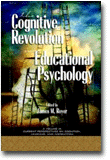
The Cognitive Revolution on Educational Psychology
Edited by:
James M. Royer, University of Massachusetts
A volume in the series: Current Perspectives on Cognition, Learning and Instruction. Editor(s): Daniel H. Robinson, University of Texas at Arlington. Marlynn M. Griffin, Georgia Southern University.
Published 2006
CONTENTS
The Cognitive Revolution's Impact of Educational Science, James M. Royer. May You Teach in Interesting Times!, Donald J. Cunningham. Social Perspectives on the Cognitive Revolution and Education: From Alien Beings to Robust Trustees, Peter Freebody. Conceptual Understanding Versus Computational Skill: How Cognitive Science Helps Resolve the Great Debate of Mathematics Education, Richard E. Mayer. The Impact of the Cognitive Revolution on Science Learning and Teaching, Eugenia Etkina, Jose P. Mestre, and Angela O’Donnell. The Self and Academic Motivation: Theory and Research after the Cognitive Revolution, Frank Pajares and Dale Schunk. The Cognitive Revolution in Scientific Psychology: Epistemological Roots and Impact on Reading Research, Ralph. E. Reynolds and Gale. M. Sinatra. Research in Instructional Technology, Jennifer Wiley, Christopher A. Sanchez and Tom Moher. From Behaviorism to Situated Cognition: An Examination of Learning and Instruction in the Second Half of the 20th Century Through the Research and Writing of Richard C. Anderson, James M. Royer. The Cognitive Revolution and Instructional Design, Marcy P. Driscoll and Kerry J. Burner. Transfer and Problem Solving: A Cognitive Integration of Metaphors, Models, and Methods, Gary D. Phye.
-
Paperback978-1-59311-162-5
Web price: $45.04 (Reg. 52.99)
-
Hardcover978-1-59311-163-2
Web price: $80.74 (Reg. 94.99)
- eBook9781607529804

-
 Assessment of Higher Order Thinking Skills
Assessment of Higher Order Thinking Skills
-
 Learning Through Visual Displays
Learning Through Visual Displays
-
 Misinformation and Fake News in Education
Misinformation and Fake News in Education
-
 Social Media
Influences on Education
Social Media
Influences on Education
-
 Teachers’ Personal Epistemologies
Evolving Models for Informing Practice
Teachers’ Personal Epistemologies
Evolving Models for Informing Practice
-
 Technology-Based Assessments for 21st Century Skills
Theoretical and Practical Implications from Modern Research
Technology-Based Assessments for 21st Century Skills
Theoretical and Practical Implications from Modern Research
-
 Use of Visual Displays in Research and Testing
Coding, Interpreting, and Reporting Data
Use of Visual Displays in Research and Testing
Coding, Interpreting, and Reporting Data

